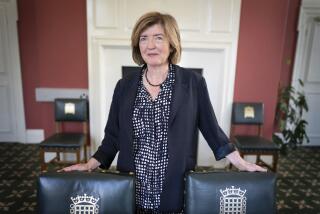Thatcher Says It’s ‘Business as Usual,’ but Shake-Up Is Seen as Her Biggest Crisis
- Share via
LONDON — Prime Minister Margaret Thatcher said today it is “business as usual” with a revamped Cabinet after her treasury chief quit, but critics and commentators called it the biggest crisis of her 10 years in power.
Even Thatcher’s staunchest supporters blamed her highhanded style of leadership for provoking Thursday’s resignation of Chancellor of the Exchequer Nigel Lawson and the ensuing run on the pound and sharp drop on the London stock market.
“The City Hit For Billions,” headlined today’s Evening Standard newspaper, saying Lawson’s resignation had wiped billions off share values, shaken the pound and raised the threat of another interest rate increase.
The main stock exchange index was off 2.2% for the day while the pound rebounded slightly from a sharp skid with the support of the Bank of England and the U.S. Federal Reserve Board.
A report by the Independent newspaper that Conservative Party legislators met secretly to discuss challenging Thatcher’s leadership could not be confirmed. Conservative and opposition lawmakers agreed that her authority had been undermined but did not believe her job was under immediate threat.
“Not now. Net yet,” said Ivor Stanbrook, a right-wing stalwart in the House of Commons.
Thatcher, starting the day with new faces in charge at the treasury, the Foreign Office and the Home Office, said government policies will continue “precisely as they were.”
“We have an excellent new team and it will be business as usual and we shall go steadily forward,” she said.
But the headline in the pro-Thatcher Daily Telegraph blared “Crisis for Thatcher” and the normally pro-Conservative Times of London said it was her biggest crisis since taking office in 1979. The Financial Times editorialized that she had put Lawson in an impossible situation and might eventually follow him out of office.
Lawson resigned because of a clash over currency policy with Sir Alan Walters, Thatcher’s private economic adviser. Lawson believed in a strong and stable pound while Walters advocated free-floating exchange rates.
According to the British media, Thatcher would not fire Walters, so Lawson resigned. Then, Walters resigned a few hours after Lawson.
Neil Kinnock, leader of the opposition Labor Party, blamed the affair on “the utter incompetence of the prime minister.”
More to Read
Sign up for Essential California
The most important California stories and recommendations in your inbox every morning.
You may occasionally receive promotional content from the Los Angeles Times.













